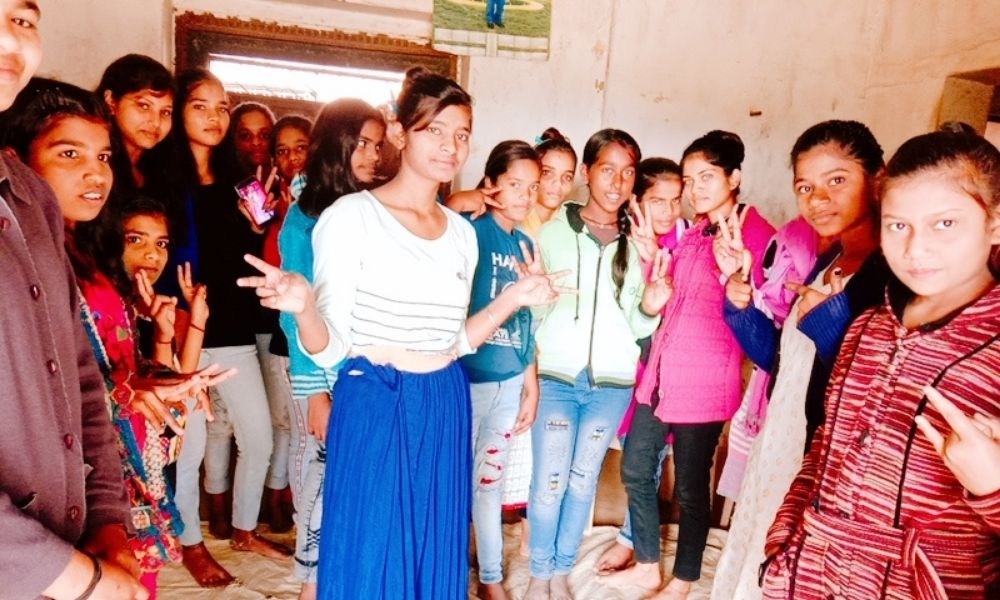
UP's Sanjana Becomes Pandemic Champion By Helping Women In Her Community Build Menstrual Health And Hygiene Knowledge
Writer: Kritika Narula
Kritika Narula is a writer, journalist and communications consultant based in Delhi
India, 28 Jan 2021 2:05 PM GMT
Creatives : Kumar Vibhanshu |
I believe that everyone has a story to tell, all you have to do is listen. I like learning new things and believe that there can never be an end to learning, and the biggest room in this world is the Room for Improvement. Seekhte Raho........
Guest Author : Kritika Narula
Kritika Narula is a writer, journalist and communications consultant based in Delhi
“A 21-year-old girl in my neighborhood had conceived a child out of wedlock and her family was hiding this information from the community out of fear of judgment. I just wanted to be able to help her,” says the 18-year-old Sanjana from Lucknow, Uttar Pradesh.
The COVID-19 pandemic and the subsequent lockdowns brought a lot of things to a deafening standstill. In rural areas, this meant that access to essential services was irregular, the mobility of people — especially women — was restricted, access to online education was marred with challenges.
That's when 18-year-old Sanjana, from Indiranagar, Lucknow in Uttar Pradesh, took matters into her own hands. When the lockdown was imposed in March 2020, she was quick to recognise the needs of girls in her community. Because of the taboo and stigma associated with menstruation, safely accessing menstrual hygiene products was becoming challenging for women and girls. Sanjana rose to the occasion to ensure health and dignity for the women in her community. She shares, "Lockdown came with a plethora of problems. Girls usually get their pads on their own, secretively, because people still don't talk about periods and menstruation openly. But now they were staying home. Since they couldn't talk about it, they were facing challenges in procuring sanitary pads. They were suffering in silence."
The situation was exacerbated for women and girls who found themselves especially vulnerable and marginalised, as access to life-saving information related to sexual and reproductive health was disrupted. Ready access to sexual and reproductive health, a basic human right, remains elusive for many women in rural areas. So when the issue got compounded during the pandemic, it came with consequences. Across the globe, concerns were voiced that people who menstruate would find it harder to a) meet their menstrual hygiene management needs or b) access safe spaces where they can access guidance on such issues.
Realising this menstrual hygiene gap in her community, she sought support from YES Foundation in order to raise funds, source these products, and then distribute them among women and girls. Yeh Ek Soch (YES) Foundation, partnered with Pravah and led a program called My Life Mere Faisle (MLMF) in her community. The programme helped her and many other young people like her to build socio-emotional capacities and leadership skills like communication, interpersonal relationship building, decision making and empathy. Sanjana started to actively advocate for knowledge building on menstrual health and hygiene for girls in her community through rallies, tableaux, and other ways of awareness generation. Now, when she interacts with others, she identifies if there are specific challenges that the community is facing and sets out to find if there's a way she can help alleviate the local issues through contextual solutions.
Reproductive health at the receiving end in a crisis
When it comes to sexual and reproductive health and rights, information and support can slip through the cracks during a crisis. Sanjana's efforts were constantly aimed at ensuring that the young girls in her community aren't deprived of this support — lockdown or not. So when she found out that a 21-year-old girl in her neighbourhood had conceived a child out of wedlock and that the girl's family was hiding this information from the community out of fear of judgement, she knew she had to intervene. "I just wanted to be able to help her," she shares.
Sanjana was concerned that the girl would need medical care and attention at this time; burying the truth wasn't going to change facts. Her passion for SRHR, supporting fellow young girls, her knowledge about the right stakeholders, and training on the correct communication methods to resolve this issue — all came in handy. And so she fearlessly championed for maternal health in her community. Sanjana recalls, "The community was shunning and ostracising the girl, because of which the girl's mental health took a hit. I intervened by moderating the conversation between the boy, who wasn't able to come to visit her due to the lockdown, as well as the family of the girl. The boy was later able to come back and they got married. Today, she's happily married and has a healthy baby." She also connected the family with Asha Jyoti Kendra women helpline centre to ensure access to legal support.
She supported the girl and advocated for her rights using the skills she learnt through the MLMF programme. Under this programme, young people come together, learn from each other, and get to understand themselves better. Through dialogue and engagement, this empowering space has helped Sanjana become a socially conscious leader, who isn't afraid to stand up for her beliefs, while simultaneously handling conflicts in an empathetic manner. It also reinforced her Youth Duties and Rights — taking leadership initiative while making decisions, creating safe spaces for intersectional identities and being a vanguard of change in her own community.
How would she have known how to mediate between the two parties — the father of the child and the girl's family — in such a stressful situation? Being a part of a space where she was able to learn about herself more deeply, was able to challenge her own beliefs and stereotypes and push her own limitations has made her capable and confident to do this. She shares, "personally, it's helped me form an identity of my own. And if you talk about the community, it has taught me how to interact with people in the field, how to be sensitive and empathetic towards them. It has given a tangible and actionable form to my willingness to help others."
 All section
All section















